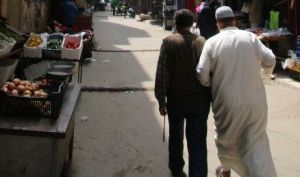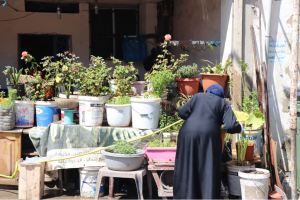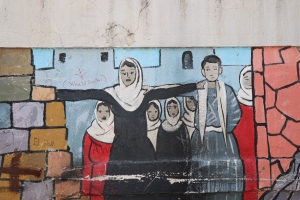What roles do communal solidarity and sociality play in spaces such as the Palestinian refugee camps in Lebanon and Jordan during the COVID-19 pandemic? This question is examined by Samar Maqusi, who draws on conversations with camp residents Abu Mohammad and Abu Ahmad, to reflect on the ‘socially conscious’ creativity developing and responding to the pandemic. Maqusi argues that UNRWA has failed to understand the needs of the camps and their residents and, in the face of inadequate support from the Lebanese state, she describes how camp residents are ensuring that food and other provisions are distributed through a ‘body of trust’, providing examples of social solidarity and refugee-refugee humanitarianism. Solidarity based, faith based and refugee-refugee led humanitarian action are all themes we are exploring in the Southern Responses to Displacement research project, which you can read more about here. In her blog, Maqusi goes on to argue that, during a time when deep rooted inequalities are further revealed and remain unaddressed throughout the pandemic, what is needed is a commitment to develop a collective imagination based on solidarity, for a better future.
This piece was originally posted on the Refugee Hosts website here.
If you find this piece of interest you may like to visit our Introductory Mini Blog Series examining how Northern led states and organisations providing humanitarian support in the South are complimented, and challenged, by locally-led programs and assistance, or visit our recommended readings at the end of this piece.
‘The displacement virus is much stronger than the coronavirus’: Reflections from Burj el-Barajneh and Baqa’a Camps in Lebanon and Jordan
by Samar Maqusi, University College London
In light of a global confrontation with the Covid-19 pandemic, what is the role of communal solidarity and sociality in spaces such as the Palestinian refugee camps in Lebanon and Jordan? Starting from the premise that Palestinian refugee camps have always been a source of knowledge, in this piece I explore this question through reference to Burj el-Barajneh Camp (Lebanon) and Baqa’a Camp (Jordan), in search of new imaginations for our collective future.
The COVID-19 pandemic caught Lebanon off-guard, emerging in the midst of a mass uprising which has been protesting decades of corrupt governance which led to challenging dire economic conditions across the country. In places of particular hardship, as in the country’s Palestinian camps, creativity in the midst of dire needs tends to not only be widespread, but also socially conscious. This is for many reasons including a history of multiple episodes of collective crisis, a lack of resources, and strong principles of “helping thy neighbour.” Palestinian solidarity in times of crisis is frequent (in both camp and non-camp geographies), and has caused a sort of “preparedness” that is often quicker and more organized in comparison to other geographies.
In addition, due to the prolonged political struggle that Palestinian refugees have lived through, there is a strong form of trust across Palestinian communities in times of crisis. This “trust” is critical when people are mobilising to confront a threat or crisis. Indeed, “trust” – between people and government, and between different people – is a primary driver for some countries adopting different physical gathering measures in the context of Covid-19, and what will, in the coming years, determine the recovery speed of different societies.
While Palestinian refugees lack a government or State to trust, they nonetheless have each other as a body of trust. Abu Mohammad, a Palestinian refugee from Burj el-Barajneh camp in Lebanon, reassures me that the camp will survive this difficult period, and more importantly, that no one will sleep hungry in the camp.
Abu Mohammad tells me that the first Palestinian initiative in response to Covid-19 emanated from Burj el-Barajneh camp, through a local Palestinian family, and reached both Mieh Mieh camp and Nahr el-Bared camp, as well as Lebanese families in Tripoli in North Lebanon. Other initiatives in Palestinian camps in Lebanon have included those led by activists and cultural groups in Baddawi camp.
Such examples of social solidarity are not only emerging in Palestinian camps in Lebanon. My friend Abu Ahmad, who is a Palestinian refugee residing in Baqa’a camp in Jordan, shared images of locally funded and mobilised food banks that emerged inside the camp as soon as Jordan announced a nationwide lockdown in March. This has been to provide for those hit the hardest by the loss of jobs inside the camp.
‘Give us temperature guns not soap’
As I write this piece, the first confirmed cases of Palestinian refugees testing positive for Covid-19 have been detected in Palestinian camps in Lebanon. As UNRWA and others have commented, this was inevitable, with UNRWA asserting that it has been quick to respond. Yet, we must keep in mind that this comes at a time when UNRWA’s resources are overstretched, including due to a political decision by the Trump administration in 2018 to suddenly stop funding the UN agency, in order to pressurise Palestinians to accept a settlement deal to end their 72-year displacement.
Its overstretched financial situation means that UNRWA has long had to be very strategic when allocating its budget. This is no easy task when attending to the needs of over 5.6 million refugees, including in 58 official camps. In the times of a pandemic, however, these considerations could make the difference between life and death inside a refugee camp.
During my videocall conversation with Abu Mohammad, I asked about UNRWA’s role in the camps. He immediately got up and returned with a bar of soap and a leaflet about COVID-19. While UNRWA has been disinfecting the camps on a rolling basis, the bar of soap and the leaflet are what refugee shelters have been receiving by means of direct assistance.

While UNRWA’s role inside Palestinian camps remains vital, after 72 years of living inside those camps, this role must be scrutinized. Anyone who has worked or lived in Palestinian camps will testify to their residents’ cleanliness and awareness. This is something that is inherent in residents’ culture and social practices. Abu Mohammad reminds me that part of many refugees’ daily routine includes praying, five times a day, which requires you to perform ablutions (i.e. washing from head to toe) before praying. Although these ablutions are in no way a substitute to disinfecting practices during the Covid-19 pandemic, it does testify to the daily cleansing practices already in place.
Abu Mohammad continued by telling me,
“Providing a soap and a leaflet is not what the camp refugees need as assistance. It would have been more effective if they had distributed those “temperature guns” and tested camps randomly and frequently.”
Understanding the current needs of camp residents and obtaining informative feedback is not a difficult task. Indeed, a rapid survey or even a brainstorming session with camp community members in the early days of the virus, would have provided UNRWA with effective feedback. In addition, it would have ensured that camp residents are active members of their camps and wellbeing. Indeed, this is something they already practice on a daily basis.

“Be sure we support each other, we support each other”
During what is now our weekly catch-up and wellbeing phone conversation, I was curious to ask Abu Mohammad how people have been able to practice “physical distancing” in a camp spatiality where buildings intersect. He immediately laughed and said, “We live on top of each other, there is no physical distancing.” He then tells me with an assured face (via WhatsApp) and a convinced tone:
“the displacement virus is much stronger than the coronavirus, this has prepared us as bodies and souls to confront any of life’s pandemics.”
Abu Mohammad is talking about the 72-years of displacement that Palestinian refugees have endured, with over 1.5 million refugees living in 58 camps across the Middle East: experiencing a health pandemic looks and behaves differently in a Palestinian camp.
During our first calls in February, Abu Mohammad was quick to convey a lack of a sense of trepidation inside the camp. Two months later, the same sense, or lack thereof, still exists. Yet, the facts on the ground tell us that the camp is a very dense spatiality and is exposed to many threats – as such, some form of spatial measures should be taking place, and indeed they are.
Abu Mohammad proceeds to tell me,
“We’re not worried, but we are trying, as much as possible, to protect our surrounding.”
I asked him how, exactly, and he tells me:
“For example, the youth of the camp decided to assemble at camp entrances around 6 or 7pm, and restrict anyone from entering the camp, especially non-camp residents, and persons who seem ill.”
Rent Money
Palestinian refugees in Lebanon are barred from most professions, and live in a nationally-dire economic condition. This led many Palestinian refugees to invest in “camp real-estate” as a form of economic wellbeing. The arrival of refugees from Syria into Lebanon since 2011, and their preference to reside in Palestinian camps (for affordability of rent and living standards, as well as attractive social networks) has meant that many Palestinian refugees built upon their shelters to benefit from the rental market. This is aided by the fact that the UNHCR provides a housing allowance for Syrian refugees, which is a lucrative guarantee for a tenant in a camp where most families depend on the availability of daily labour income.
Abu Mohammad is himself the owner of a 5-story building in Burj el-Barajneh camp: he rents out four shelters, and chooses to live on the rooftop, or “in the skies” as he would say. Since Abu Mohammad retired from his job as an UNRWA driver, he has been living off his rent earnings. As Palestinians in Lebanon are denied social security benefits, every Palestinian in Lebanon has to find a way to invest if they want to ensure some form of income after retirement. Of course, many Palestinian families (and Lebanese for that matter) depend on remittances from families abroad as a monthly income, but not Abu Mohammad. Amidst the hardships of the pandemic, Abu Mohammad tells me he takes whatever rent money each family is able to give him:
“I know what every family renting from me is going through. I cannot ask someone to give what they do not have.”
The great revealer
Far from early cries declaring Covid-19 the “great equalizer,” the pandemic is, instead, the “great revealer.” The pandemic is continuously revealing, and in fact deepening, the intersecting inequalities which have long infected the deep tissue of many societies. In the Lebanese context, the pandemic creeped in on an already fragile economy, which contributed to the start of the popular uprising last October.
For Palestinian refugees in Lebanon, the economic situation has always been discriminatory. Palestinians have long been barred from working in as many as 70 commercial and administrative professions. Additionally, in 2019 the Lebanese Ministry of Labour suddenly invoked a law that requires Palestinian refugees to obtain work permits, and “work contracts that force their employers to pay a 23 percent social security tax on their behalf.” With Palestinians having never been subjected to these requirements before, protests and outrage spread across Lebanon’s camps in the summer of 2019.
The Covid-19 pandemic has rendered these conditions even more abysmal, requiring refugees to exert two and three-times the effort to make ends meet, compared to others holding citizenship rights. In addition, in the midst of a pandemic, the inequalities are not only about gains, but about losses as well, with the most vulnerable enduring the most of it.
While the globe is inundated with news on Covid-19 and its possible aftermath, some communities are unable to turn a blind eye on many other, more pressing issues affecting their lives. This was evident in Lebanon when people
returned to protest in the streets on 21 April, albeit choosing to form a motorcade instead of walking the street (to maintain the mandatory physical distancing), with many wearing facemasks. All of this demonstrates that economic equality, social justice and political rights will remain fundamental objectives across societies even when facing health pandemics. The current pandemic should not deceive us into thinking that those objectives are obsolete in times of global crisis. On the contrary, it should remind us that without solving the former, the post-pandemic scene will be even more dire, and more violent than what we are witnessing right now.
Imagining Futures
Our imaginations have been running wild about what a post-pandemic world could look like, be it socially, economically, politically or environmentally. As part of this exercise of imagining futures, which for many is a healthy process, people have been pondering on how we have been exercising life, and how to better exercise it in the near future. To answer the latter, we require a collective imagination. One that can ensure the participation of all. While “common humanism” is something that we have to work together to define, it cannot exist without the “common” (what we share) and without the “human” (who have the right to share).
As my phone conversation with Abu Mohammad was ending, he quickly reminded me before our concluding goodbye that:
“God required us to fast during Ramadan so we can feel hunger and what it is for a person to be hungry. And now, we have been confined to our homes. Yet whatever we need is provided to us. Nevertheless, many people are already finding this intolerable. Imagine what places like Cuba and Gaza, which have been under sanctions and siege for years go through. How have they been able to tolerate it?”
As Abu Mohammad so profoundly notes, a better future for humans begins with sympathy and solidarity.
**
Refugee Hosts welcomes contributions that examine local responses to displacement, including refugee- and citizen-led responses to the challenges arising both from COVID-19 and the different policies and politics arising in the context of the pandemic. If you would like to join this conversation please visit our ‘Submit a Blog’ page here.
If you found this piece of interest you may like to access the recommended reading below:
Akay Erturk, S. (2020) The effects of COVID-19 on Syrian Refugees in Turkey
Berg, M. and Fiddian-Qasmiyeh, E. (2018) Hospitality and Hostility towards Migrants: Global Perspectives—An Introduction
Carpi, E. (2019) Syrian Faith Leaders in Displacement: Neglected Aid Providers?
Delioglu, F. (2019) The ‘Al Shami Kitchen Project’ – Solidarity amongst Syrian Refugee Women in Izmit, Turkey
Diab, J. (2020) Syrian Refugees in Lebanon amid Confinement, Health Scares and Escalating Needs
Fiddian-Qasmiyeh, E. (2020) ‘Refugee-led local responses in the time of Covid-19: Preliminary reflections from North Lebanon’
Fiddian-Qasmiyeh, E. (2018) Histories and spaces of Southern-led responses to displacement
Fiddian-Qasmiyeh, E. and Qasmiyeh, Y. M. (2017) Refugee-refugee solidarity in death and dying
Fiddian-Qasmiyeh, E. (2017) Syrian Refugees in Turkey, Jordan and Lebanon Face an Uncertain 2017
Loris-Rodionoff, C. (2017) Hope, Resilience and Uncertainty: A Day with Displaced Syrians in Southern Turkey
Oklah, H. (2020) “I had to sell a gift my sons gave to me on Mother’s Day”: Syrian Refugees and Coronavirus “Post-stability Destabilization”
Ozturk, M. (2018) ‘Municipal-level responses to Syrian refugees in Turkey: The case of Bursa
Maqusi, Samar (2018) Photo Gallery: Burj el Barajneh Camp
Maqusi, Samar (2016) Photo Gallery: Baqa’a Camp
Featured image: A view of Burj el-Barajneh camp, showing the continued vertical build-up of the towering camp shelters, as a form of rent investment encouraged by the arrival of refugees from Syria in the camp. Beirut, November 2019. ©Samar Maqusi







Leave a comment